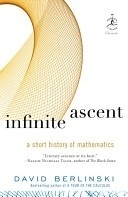In Infinite Ascent, David Berlinski, the acclaimed author of The Advent of the Algorithm, A Tour of the Calculus, and Newton’s Gift, tells the story of mathematics, bringing to life with wit, elegance, and deep insight a 2,500-year-long intellectual adventure. Berlinski focuses on the ten most important breakthroughs in mathematical history–and the men behind them. Here are Pythagoras, intoxicated by the mystical significance of numbers; Euclid, who gave the world the very idea of a proof; Leibniz and Newton, co-discoverers of the calculus; Cantor, master of the infinite; and Gödel, who in one magnificent proof placed everything in doubt. The elaboration of mathematical knowledge has meant nothing less than the unfolding of human consciousness itself. With his unmatched ability to make abstract ideas concrete and approachable, Berlinski both tells an engrossing tale and introduces us to the full power of what surely ranks as one of the greatest of all human endeavors. Review: No one knows for sure when mathematics went from being a functional system for keeping track of sheep to a philosophical system that transcended the objects it counted, but as well-known science writer Berlinski (Tour of the Calculus) tells readers, around 500 B.C. Pythagoras elevated mathematics into a religion. It has kept its near-mystical status ever since. (Even students instructed in its arcane languages can only gape at how numbers dictated where missing elementary particles like positrons and quarks were to be found.). Readers may have heard of the short-lived Evariste Galois, killed in a duel over a woman, but here they will come to understand his importance to group theory, his thoughts scribbled down the night before his death. Non-Euclidean geometry led to Einstein’s universe, and Berlinski introduces us to the German scientists who opened the door to multiverses: Gauss, Cantor and Riemann. Finally, we encounter Kurt Gadel, who threw the acolytes of mathematics into a panic with his incompleteness theorem. Readers will need to remember some of their high school math to benefit from Berlinski’s discussions of calculus and complex numbers, but his engaging style should attract many readers, science buffs and generalists alike to this excellent entry in Modern Library’s Chronicles series.
INFINITE ASCENT: A Short History of M
$11.95
Sold Out
Additional Information
| Author | Berlinski, David |
|---|---|
| Number of pages | pp.197 |
| Publisher | Modern Library |
| Year Published | 2008 |
| Binding Type | Softcover |
|---|
